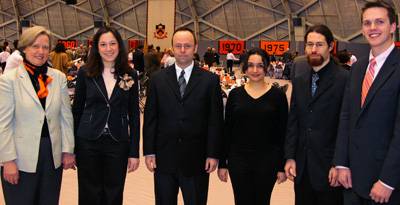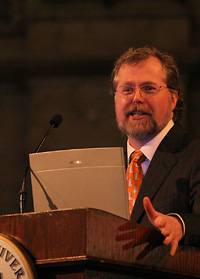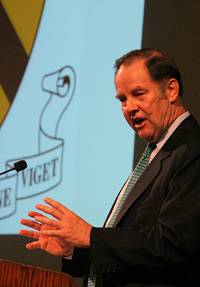Princeton University recognized the winners of the highest honors it
awards to students at Alumni Day ceremonies Saturday, Feb. 26.
Senior Amy Saltzman received the University's Moses Taylor Pyne Honor
Prize, and graduate students Paul Copp, Holly Sanders, Scott Shell and
Lior Silberman were honored as co-winners of the Porter Ogden Jacobus
Fellowship.
The Pyne Honor Prize, the highest general distinction conferred on an
undergraduate, is awarded to the senior who has most clearly manifested
excellent scholarship, strength of character and effective leadership.
The Jacobus Fellowship, which supports the final year of graduate
study, is awarded to students whose work has displayed the highest
scholarly excellence.
Pyne Prize
Saltzman, who is from Gates Mills, Ohio, is concentrating in
anthropology and also has done a significant amount of work in
molecular biology. As she has put it: "Although I have wanted to be a
doctor from a very young age, anthropology has challenged me to look at
my goal in a new way. ... Looking forward, I aspire to combine the
practice of medicine with ethnographic fieldwork and teaching in social
medicine, each enriched by anthropological understanding."
Saltzman has assisted in research in the genetics department at Case
Western Reserve University, at Athersys Inc., a biopharmaceutical
company in Cleveland, in the social medicine department at Harvard
University, and in the molecular biology and anthropology departments
at Princeton. Anthropology professor João Biehl has compared her
"intellectual excitement, social-mindedness, and all-too-rare capacity
to integrate theory and observation" to that of the young Margaret Mead.
Like that famous anthropologist, Saltzman has traveled to Melanesia to
do fieldwork. She spent last summer in Fiji, where she conducted
research for her senior thesis on the postnatal experience, including
postpartum depression, of ethnic Fijian women against a backdrop of
rapid social and economic change. She has been a key organizer behind
the University's Undergraduate Research Symposium and its Bioethics
Forum.

Also active in extracurricular activities, Saltzman has participated in the Undergraduate Student Government since her sophomore year, first as a U-councilor, then as academics chair and currently as U-Council chair. She played an instrumental role in reinvigorating the University's preceptorial system, helping to craft a guide for students, preceptors and course heads called "Inspired Conversations: The Princeton Precept." She also served as a wilderness leader for Outdoor Action, a pre-orientation program for freshmen.
A graduate of the Hathaway Brown School, Saltzman is the daughter of Mark and Shelly Saltzman of Gates Mills, Ohio.
In recognizing her at the Alumni Day ceremony, Princeton President Shirley M. Tilghman predicted that Saltzman's "blend of passion and compassion will carry [her] far and, in the process, humanize and elevate any field in which she works."
Jacobus Fellowships
Copp is a doctoral student in the Department of Religion. He earned his bachelor's degree in English from the University of Connecticut-Storrs and his master's degree in Chinese from the University of Massachusetts-Amherst. He has spent nearly five years in Taiwan.
His dissertation research focuses on the imagination and makings of Buddhist spells in late medieval China, demonstrating the central place these spells held in Chinese Buddhist traditions. Professor Jacqueline Stone has described Copp as "a fine scholar and an astute, subtle thinker, with outstanding analytical skills."
Sanders is a doctoral student in the Department of History. She earned her bachelor's degree in Asian studies from the University of Texas-Austin and her master's degree in Japanese studies from Osaka University in Japan. In the words of professor Hendrik Hartog, she "has that rare justified confidence in her judgment that is ... the common mark of all the really great historians I have known."
Her dissertation research examines the impact of U.S. military policy and social and legal change on the Japanese sex industry after World War II. Her choice of subject reflects her deep-seated interest in the status of women, as well as the insights she has gathered as a counselor to victims of domestic violence in Mercer County.
Shell is a doctoral student in the Department of Chemical Engineering. He earned his bachelor's degree in chemical engineering from Carnegie Mellon University. His research uses theory and computer simulation to model how liquids become glasses and to understand protein design -- work that could have significant implications for emergent nanotechnologies.
Professor Pablo Debenedetti, who is his adviser along with professor Athanassios Panagiotopoulos, said that Shell's "originality, creativity and maturity as a scientist are extraordinary," and he groups Scott with the exceptional individuals who "can completely transform an entire field thanks to the power of their intellect." Shell also shares his scientific skills with local youngsters through the University's Scholars in the Schools Program.
Silberman, a doctoral student in the Department of Mathematics, holds his undergraduate degree from the Hebrew University of Jerusalem. Known for his impressive ability to assimilate a wide range of data and apply it to intractable problems, he has developed what professor Peter Sarnak calls a "spectacular thesis."
Silberman's research, which combines his lifelong interest in mathematics and physics, applies intuition from mathematical physics and techniques from geometry and dynamics to problems in analytic number theory.



